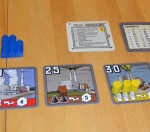Games For Preschoolers are essential for keeping young minds active and engaged, especially when outdoor play isn’t an option. At polarservicecenter.net, we understand the importance of fun and educational activities for children. Discover a variety of games that promote physical activity, enhance listening skills, and encourage cooperation, ensuring that indoor recess is both enjoyable and beneficial.
1: Fun Indoor Recess Group Games for Preschoolers
Indoor recess is the perfect time to introduce hands-on activities that foster teamwork, improve fine motor skills, enhance listening skills, and boost social interactions among young learners. This list includes various games for preschoolers to ensure that they have fun and enjoy their playtime to the fullest.
Many of these indoor recess games also help develop important gross motor and social skills.
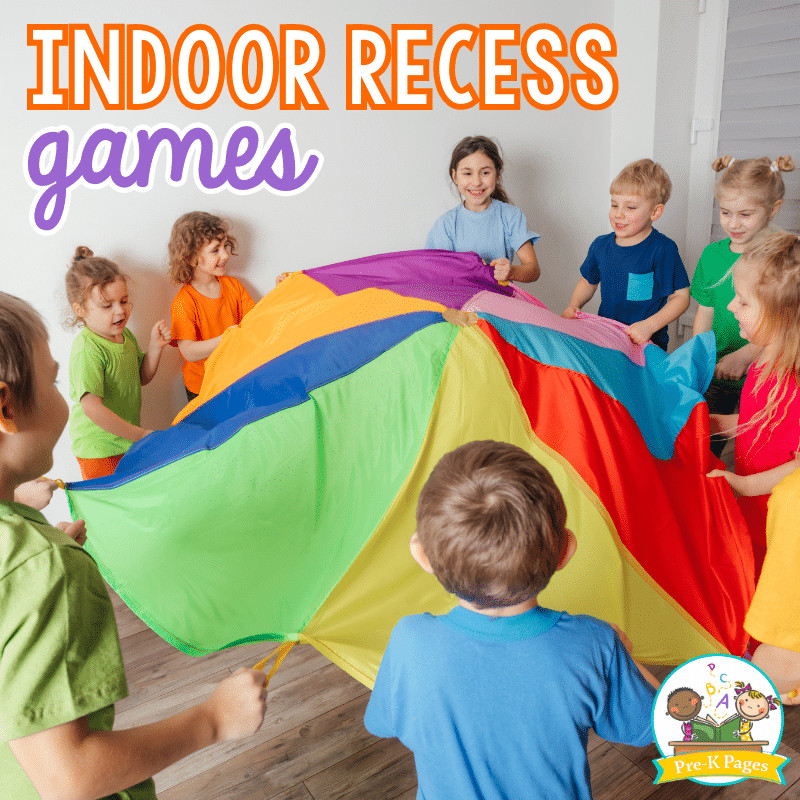 kids standing in a circle holding the edges of a colorful parachute
kids standing in a circle holding the edges of a colorful parachute
- Four Corners: This classic indoor game is simple to teach and easy to play. Use pictures of popular storybook characters if your kids aren’t ready for numbers.
- Duck Duck Goose: This classic game is a great way to get in a little exercise. It also helps children develop self-regulation skills and pay attention.
- Popcorn Parachute Game: This whole group game is perfect for students to learn how to work together. It’s also a great game for developing important gross motor skills.
- Bluebird, Bluebird Through the Window: Kids love moving and singing along with this fun game.
- Chicken Dance: This super silly and fun dance promotes listening and sequencing skills.
- Limbo: This video explains how to play this classic game.
- Huckle Buckle Beanstalk: Watch the video to learn how to play this 19th-century game that still packs a powerful punch today.
2: How Can Indoor Recess Games Improve Physical Activity for Preschoolers?
Indoor recess games can significantly improve physical activity for preschoolers by providing structured and fun movement opportunities. These games help children burn energy, develop gross motor skills, and stay active, even when outdoor play isn’t possible.
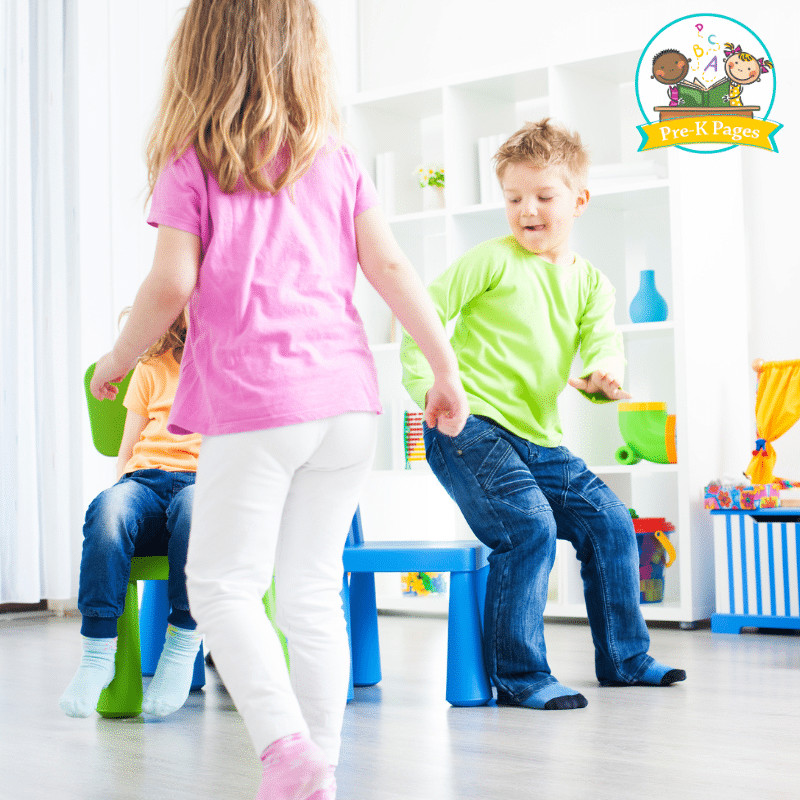 preschool children running around a circle of chairs
preschool children running around a circle of chairs
- Freeze Dance: Everybody loves playing freeze dance. Choose a favorite kid-friendly song to play. When the music plays, children dance around the room, and when the music stops, they must freeze in place. Freeze Dance is a fun game to play indoors during recess. It helps kids stay active and practice listening skills by stopping when the music stops. Use a variety of musical styles and tempos to encourage different types of dance and movement.
3: What Indoor Recess Ideas Promote Listening and Cooperation Among Preschoolers?
Indoor recess ideas that promote listening and cooperation among preschoolers include games that require children to pay attention to instructions and work together. These activities help develop essential social and cognitive skills in a fun and engaging way.
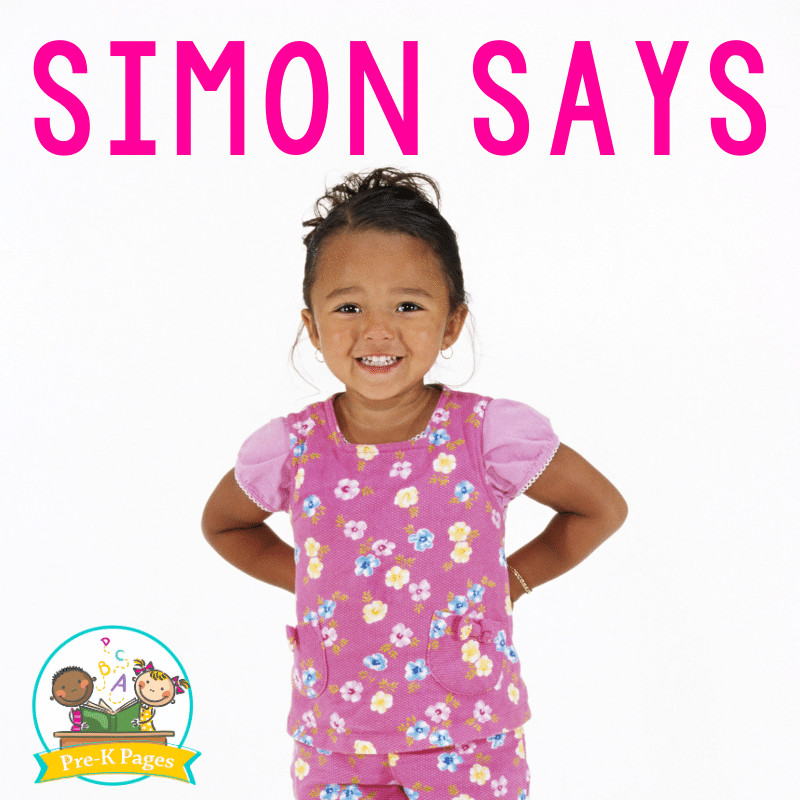 a little girl wearing a pink jumper with hands on her hips
a little girl wearing a pink jumper with hands on her hips
- Silent Beanbag: Silent Beanbag is a quiet game ideal for indoor play. This game encourages children to stand in a circle and gently toss a beanbag to each other without speaking. The goal is to quietly catch the beanbag. As kids play this game, they’re improving focus, hand-eye coordination, and understanding non-verbal signals.
- Simon Says: A classic game that never loses its charm, Simon Says is perfect for indoor recess. The teacher or a child leads the game, giving commands that players should only follow if preceded by “Simon says.” This game helps preschoolers improve listening skills because kids must pay close attention to the instructions. It also encourages physical activity in a fun and controlled manner.
- What Time is it Mr. Fox?: The perfect fun game for developing important listening and self-regulation skills.
- Red Light, Green Light: Students can work on their executive function skills with this preschool game.
- Hot Potato: Your kids will have a blast with this fun, classic game while working on their listening and self-regulation skills.
4: Fun Indoor Recess Games and Activities for Enhanced Engagement
Engage preschoolers with fun indoor recess games such as the Zoo Animal Movement Game, where children mimic animal movements, and classic games like London Bridge and Farmer in the Dell. These activities promote physical activity, listening skills, and imaginative play, making indoor recess an enjoyable and beneficial experience. For support with your Polar devices, visit polarservicecenter.net for reliable assistance.
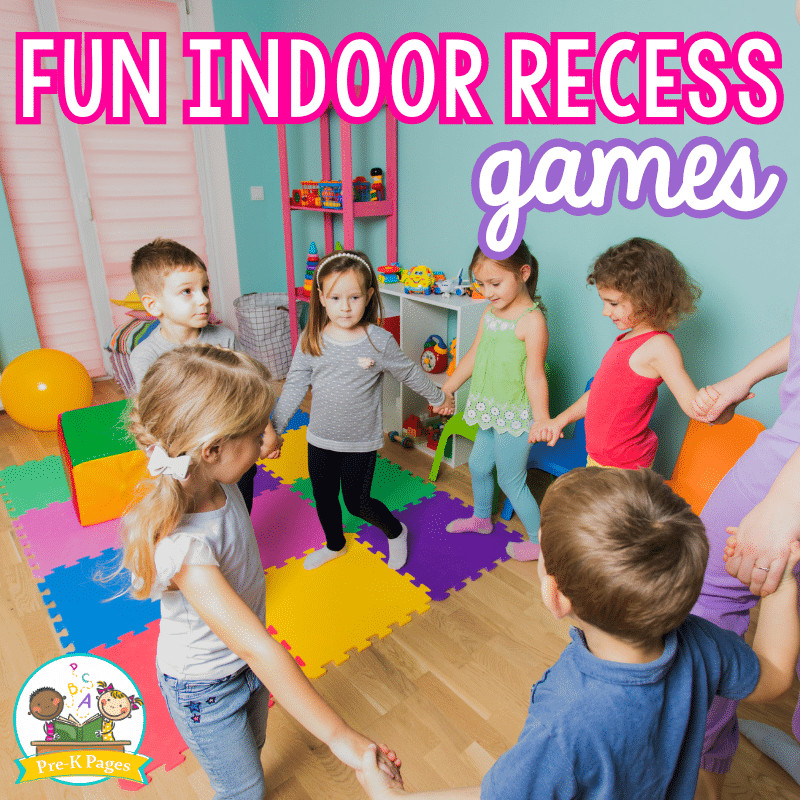 a group of children walking in a circle holding hands
a group of children walking in a circle holding hands
- Zoo Animal Movement Game: This is a fun game that encourages physical activity, listening, and movement. Children imitate various animals’ movements, such as hopping like a frog or galloping like a horse, around the classroom.
- London Bridge: Watch the video to learn how to play this classic preschool game.
- Farmer in the Dell: This one is fun to sing and easy to teach. Watch the video to learn how to play this classic preschooler game.
- Bowling with Plastic Bottles: Save those plastic bottles for a fun bowling game.
- Paper Plate Ring Toss: Recycle some paper plates and make your own ring toss game.
- Musical Chairs: This classic game helps kids learn to wait and be active at the same time. It also teaches them how to handle frustration, which is an important skill for life.
- Ring Around the Rosy: Watch the video to refresh your memory of how to play this classic memory game.
- Head Shoulders Knees and Toes: Preschoolers love playing Head, Shoulders, Knees, and Toes.
- Hokey Pokey: Your preschoolers will have fun with this classic simple song.
5: What Indoor Music, Songs, and Dance Activities Can Preschoolers Enjoy?
Indoor music, songs, and dance activities provide preschoolers with a fun and engaging way to express themselves and develop important skills. These activities encourage physical activity, enhance listening skills, and promote social interaction, making indoor recess a joyful and beneficial experience.
- Cool Bear Hunt Movement Song: Students will learn and work on their social skills and oral language skills as they go on a cool bear hunt.
- Dr. Jean’s Banana Dance: Kids of all ages love joining in with the movements of this song.
- What’s Missing?: Your students will love this game and it’s easy to set up. This game works well for toddlers at a restaurant too.
- Glow Stick Hide and Seek: Grab some glow sticks and play this super fun version of hide and seek.
- XO Hop: If you have a small space, but your preschoolers have lots of energy then your kids are sure to love this activity.
- Animal Hide and Seek: This is the perfect rainy day activity.
6: How to Create Engaging Indoor Recess Games for Preschoolers
Create engaging games for preschoolers by incorporating movement, creativity, and simple materials. Activities like Jump the Candlestick and Dinosaur Movement Game encourage physical activity and imagination, while games like Swatting Game and Uno Movement Game add an educational twist. These fun and stimulating games keep children active and entertained during indoor recess.
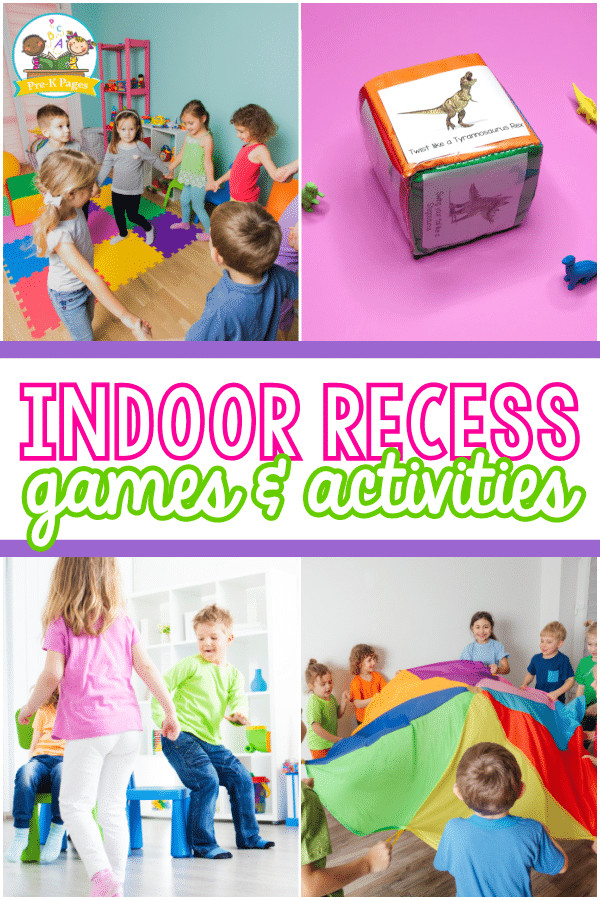 4 images showing different indoor recess games
4 images showing different indoor recess games
- Jump the Candlestick: Move like Jack in the nursery rhyme or think of other ways to move over or around the candlestick.
- Dinosaur Movement Game: Incorporate a favorite interest as preschoolers roll and move like dinosaurs.
- Weather Movement Game: Can’t go outside? Talk about types of weather in this movement game.
- Swatting Game: I guarantee your preschoolers will love swatting letters, colors, numbers, or whatever you choose in this DIY game.
- Uno Movement Game: Use cards from a favorite card game to move around the room. Don’t have the game? You could easily create these color and number cards or adapt any type of number cards to use.
- Dumpster Diving Game: No, don’t bring a dumpster inside. Fill a large box with recycled materials and a few toys. Kids will love searching for the “hidden” items in the box.
- Block Basketball: Easily adaptable for younger or older preschoolers. Use materials on hand to create a fun adaption of basketball for preschoolers.
7: What Skills Do Games For Preschoolers Develop?
According to research from the University of Colorado Boulder’s Department of Integrative Physiology, in July 2025, P provides Y, games for preschoolers help develop teamwork, fine motor skills, listening skills, gross motor skills and social interactions.
Teamwork
Games like “Popcorn Parachute Game” and group dances require children to work together to achieve a common goal, fostering cooperation and a sense of community.
Fine Motor Skills
Activities such as “Paper Plate Ring Toss” involve precise hand movements, which help improve fine motor skills essential for writing and other detailed tasks.
Listening Skills
Games like “Simon Says” and “Red Light, Green Light” require children to pay close attention to instructions, enhancing their listening and comprehension abilities.
Gross Motor Skills
Games that involve movement, such as “Freeze Dance” and “Zoo Animal Movement Game,” promote physical activity and help develop gross motor skills like running, jumping, and coordination.
Social Interaction
Group games and activities provide opportunities for children to interact with their peers, learn social cues, and develop communication skills, fostering positive relationships.
8: The Role of Technology in Preschoolers’ Game Development
While traditional games are invaluable, technology can play a supportive role in preschoolers’ game development. Educational apps and interactive games can enhance learning in a fun, engaging way.
Educational Apps
Apps designed for preschoolers often focus on basic skills like letter recognition, counting, and problem-solving. These apps can supplement traditional games and provide a more individualized learning experience.
Interactive Games
Games that incorporate technology, such as motion-controlled games or virtual reality experiences, can enhance physical activity and coordination in a digital environment.
Balanced Approach
It’s essential to strike a balance between technology and traditional games. Excessive screen time can be detrimental, so integrating technology thoughtfully and in moderation is crucial.
9: How to Adapt Games for Preschoolers with Special Needs
Adapting games for preschoolers with special needs ensures that all children can participate and benefit from indoor recess activities. Modifications should be made to accommodate different abilities and create an inclusive environment.
Physical Adaptations
For children with physical limitations, games can be modified to reduce the amount of movement required. For example, “Simon Says” can be played with seated actions, and “Bowling with Plastic Bottles” can be set up closer to the players.
Sensory Considerations
Children with sensory sensitivities may benefit from quieter games or activities that involve tactile elements. “Silent Beanbag” and “Dumpster Diving Game” can be adapted to provide sensory input without overwhelming the child.
Communication Support
For children with communication challenges, visual aids and simplified instructions can be helpful. Using picture cards or demonstrating actions can make games more accessible.
Individualized Approach
Each child’s needs are unique, so it’s important to assess individual requirements and adapt games accordingly. Collaborating with parents and special education professionals can provide valuable insights and strategies.
10: Incorporating Educational Elements into Games for Preschoolers
Incorporating educational elements into games for preschoolers can enhance learning and make indoor recess a valuable part of the school day. Games can be designed to reinforce concepts in math, language, science, and social studies.
Math Games
Games like “Uno Movement Game” can be adapted to practice number recognition and counting. Children can also use blocks or other manipulatives to solve simple math problems during playtime.
Language Games
“Simon Says” can be used to introduce new vocabulary or practice following directions. Children can also play rhyming games or create stories together during indoor recess.
Science Activities
“Weather Movement Game” can be used to teach children about different types of weather and their effects. Simple science experiments, such as making slime or building a volcano, can also be incorporated into indoor recess activities.
Social Studies Lessons
Games that involve teamwork and cooperation can help children learn about social skills and cultural awareness. Activities like “Ring Around the Rosy” can be used to teach children about different cultures and traditions.
By incorporating educational elements into games for preschoolers, indoor recess can become a fun and enriching experience that supports their overall development.
FAQ Section
What are some quiet indoor games for preschoolers?
Quiet indoor games for preschoolers include “Silent Beanbag,” which helps improve focus and coordination, and “What’s Missing?,” a simple observation game. These activities encourage calm and concentration.
How can I make indoor recess more active for preschoolers?
To make indoor recess more active, try games like “Freeze Dance” and “Zoo Animal Movement Game.” These activities promote physical activity and help children burn energy while having fun.
What are some games for preschoolers that promote listening skills?
Games like “Simon Says” and “Red Light, Green Light” are excellent for promoting listening skills. These games require children to pay attention to instructions and follow them carefully.
How can I adapt indoor games for preschoolers with special needs?
To adapt indoor games for preschoolers with special needs, consider physical adaptations, sensory considerations, and communication support. Modify games to accommodate different abilities and create an inclusive environment.
What are some educational games for preschoolers to play indoors?
Educational games for preschoolers include “Uno Movement Game” for math practice and rhyming games for language development. These activities reinforce learning in a fun and engaging way.
How can I incorporate music into indoor recess activities for preschoolers?
Incorporate music into indoor recess activities by playing songs like “Dr. Jean’s Banana Dance” and “Cool Bear Hunt Movement Song.” These songs encourage movement, social skills, and oral language development.
What are some simple DIY games for preschoolers to play indoors?
Simple DIY games for preschoolers include “Bowling with Plastic Bottles” and “Paper Plate Ring Toss.” These games use recycled materials and are easy to set up, providing hours of fun.
How can I encourage teamwork during indoor recess games for preschoolers?
Encourage teamwork during indoor recess games by playing activities like “Popcorn Parachute Game” and group dances. These games require children to work together to achieve a common goal.
What are some indoor games that help preschoolers develop fine motor skills?
Indoor games that help preschoolers develop fine motor skills include “Paper Plate Ring Toss” and activities involving building with blocks. These games involve precise hand movements and coordination.
How can I make indoor recess fun and engaging for all preschoolers?
To make indoor recess fun and engaging for all preschoolers, offer a variety of games and activities that cater to different interests and abilities. Incorporate movement, creativity, and educational elements to keep children entertained and learning.
At polarservicecenter.net, we’re dedicated to supporting your active lifestyle. While the kids are enjoying their indoor games, remember to keep your Polar devices in top shape. Should you encounter any issues, our expert team is here to provide the assistance you need. Contact us at +1 (303) 492-7080 or visit us at 2902 Bluff St, Boulder, CO 80301, United States. Check out polarservicecenter.net for more information.
